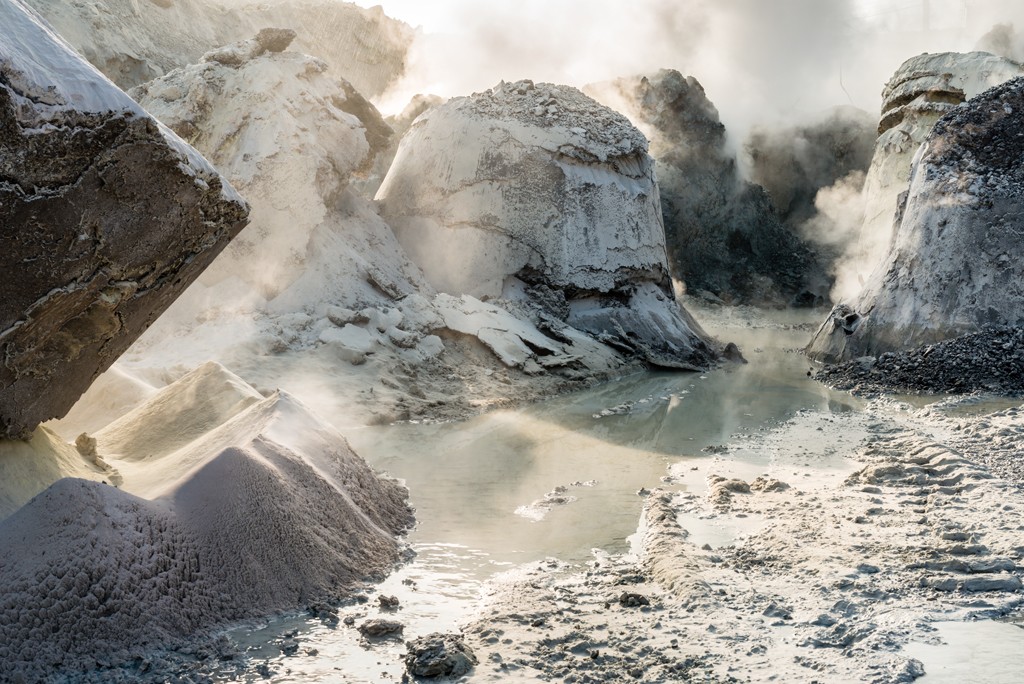Giuseppe Licari
Schlak
16 Mar - 14 May 2017
GIUSEPPE LICARI
Schlak
16 March - 14 May 2017
On Thursday 16 March, TENT presents Schlak, a solo exhibition by Giuseppe Licari. Schlak is the latest chapter in Giuseppe Licari’s research into the relationship between man and nature. In one of the most important raw-material producing areas of the European steel industry, like a geologist Licari collected the stones that remain as a residue after the iron is smelted at 1535 ̊C. Licari shows his slag stone collection alongside images that evidence how human activity has created a whole new geological layer.
Schlak
Licari presents his slag stone collection in the form of a modern mineralogical cabinet. He extracted pigments from the slag stones, as artists used to obtain pigments from precious stones. His pictures of the post-industrial landscape, with strange colours and artificial hills up to fifty meters high, are both alarming and fascinating.
Landscape images and mineral collections once helped inform the idea that nature is a wealth of products and raw materials, making its exploitation seem natural. Licari’s photographs and mineral cabinet recall this history, and reflect the world that emerged from it. His slag stone collection reads like a geological record, attesting to the economic and social processes that shaped the contemporary landscape. But it also raises questions: what kind of future ecosystems can our human-made soil sustain? What do we want to know and not want to know about this future nature?
Schlak was made during a residency in Belval, a former mining area in Luxembourg. The steel industry, a key factor in the growth of the global economy, has left its traces everywhere. Controversial steel slags were also used in the Netherlands, including in the construction of dikes. We are so accustomed to landscapes of industrial waste; we hardly notice them.
Giuseppe Licari
Giuseppe Licari (Italy, 1980) studied at the AKI in Enschede and the Academy of Fine Arts in Bologna. He develops projects related to industrial and natural heritage, often on location, including in Sicily, Rotterdam, and Idaho, and in collaboration with partners such as the Natural History Museum Rotterdam, TU Delft or wildland firefighters. He has exhibited work in Stockholm (2011), St Petersburg (2013), Birmingham (2013), and Boise (2016) in America. In 2012, his spectacular installation Humus was shown at TENT. Giuseppe Licari has been living in Rotterdam since 2007.
The Schlak project was created during the residency programme Public Art Experience – BeHave by Le Fonds Belval, Belval, Luxemburg.
Schlak
16 March - 14 May 2017
On Thursday 16 March, TENT presents Schlak, a solo exhibition by Giuseppe Licari. Schlak is the latest chapter in Giuseppe Licari’s research into the relationship between man and nature. In one of the most important raw-material producing areas of the European steel industry, like a geologist Licari collected the stones that remain as a residue after the iron is smelted at 1535 ̊C. Licari shows his slag stone collection alongside images that evidence how human activity has created a whole new geological layer.
Schlak
Licari presents his slag stone collection in the form of a modern mineralogical cabinet. He extracted pigments from the slag stones, as artists used to obtain pigments from precious stones. His pictures of the post-industrial landscape, with strange colours and artificial hills up to fifty meters high, are both alarming and fascinating.
Landscape images and mineral collections once helped inform the idea that nature is a wealth of products and raw materials, making its exploitation seem natural. Licari’s photographs and mineral cabinet recall this history, and reflect the world that emerged from it. His slag stone collection reads like a geological record, attesting to the economic and social processes that shaped the contemporary landscape. But it also raises questions: what kind of future ecosystems can our human-made soil sustain? What do we want to know and not want to know about this future nature?
Schlak was made during a residency in Belval, a former mining area in Luxembourg. The steel industry, a key factor in the growth of the global economy, has left its traces everywhere. Controversial steel slags were also used in the Netherlands, including in the construction of dikes. We are so accustomed to landscapes of industrial waste; we hardly notice them.
Giuseppe Licari
Giuseppe Licari (Italy, 1980) studied at the AKI in Enschede and the Academy of Fine Arts in Bologna. He develops projects related to industrial and natural heritage, often on location, including in Sicily, Rotterdam, and Idaho, and in collaboration with partners such as the Natural History Museum Rotterdam, TU Delft or wildland firefighters. He has exhibited work in Stockholm (2011), St Petersburg (2013), Birmingham (2013), and Boise (2016) in America. In 2012, his spectacular installation Humus was shown at TENT. Giuseppe Licari has been living in Rotterdam since 2007.
The Schlak project was created during the residency programme Public Art Experience – BeHave by Le Fonds Belval, Belval, Luxemburg.

